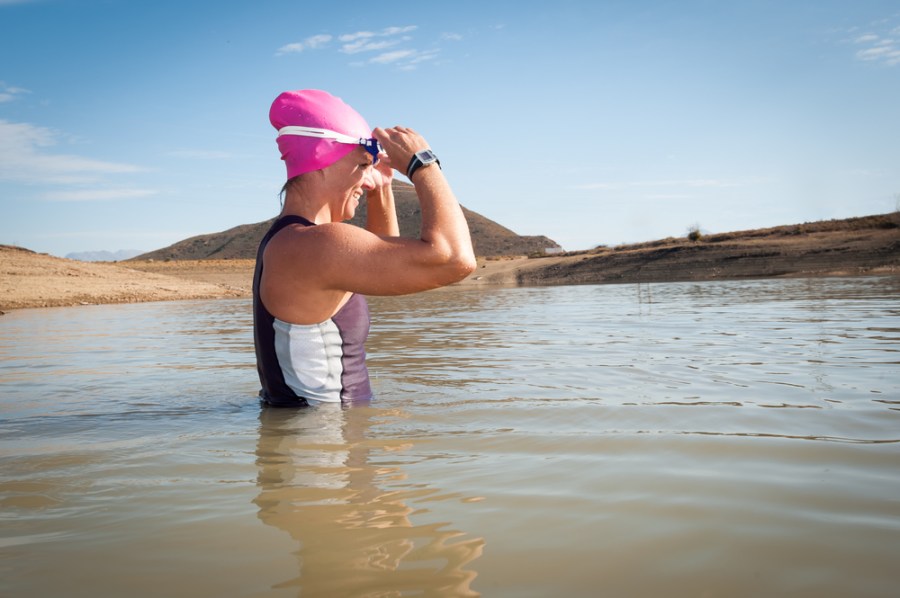Louise Pyne reveals the benefits of open water swimming and lists some of the best open water swim events in the UK.
Whether you’re dipping into lakes, wading your way through rivers, or diving into the deep blue sea, now’s the perfect time to take an outdoor dip. Extreme adventure sports have grown in popularity over the past few years and a record 7.5 million of us now regularly head to the great outdoors to get our water fix.
Open water swimming pushes you outside the boundaries of your comfort zone, and it’s one of the best ways to challenge yourself both physically and mentally. Achieving something that you’ve never before experienced and facing your fears before can be a huge confidence booster, reigniting your focus and energy. And there’s more. Wading through water is also thought to make us happier. Findings from Swim England’s Value of Swimming Report in late 2019 revealed that 1.4 million of us report lower levels of anxiety and depression thanks to swimming. Remarkably, swimmers are 4.3 per cent happier than non-swimmers – and with outdoor swimming this happiness boost is more than doubled. ‘The rhythmic motion of swimming can help the stressful feelings dissipate as you focus on your body’s movement. It is almost an exercise in mindful meditation as we glide through the water,’ adds Jane McCormick, world record English Channel two-way crossing team member and Swim England Level 2 coach at Open Swim.
Feel-good factor
And there’s a string of pretty impressive health benefits too. When we jump into cold water, the extreme change in temperature signals to our heart to pump more blood to our organs. ‘As a result, circulation is improved, and toxins are more readily flushed out of our system,’ reveals Jane. Taking to the open water also helps to improve your sleep routine. ‘Cold water stimulates the parasympathetic nervous systems, which helps your body rest and repair itself. This will give a feeling of relaxation and calm which should then result in a better night’s sleep’, she continues. And last but not least, getting a cold-water fix could help to enhance your immunity. ‘On regularly immersing yourself in cold water, you will experience something called ‘cold water shock’. This shock can kick start the immune system, helping to produce more white blood cells and antioxidants which are proven to boost our immune system and reduce various illnesses from the common cold to heart disease,’ says Jane.
Stay safe
While outdoor locations are obviously a lot cooler than an indoor pool, the rivers and lakes that were bone-chilling in winter are starting to heat up which makes spring a great time to take a dip. ‘Consequently, this means that the risk of cold-water shock will be minimised. You will still feel the cold as you gasp to catch your breath, but the risk of this developing into hypothermia is far less. The air temperature tends to be warmer which means that, on exiting the water, you will be able to get warm and dry quicker,’ says Jane. Enter the water slowly to help your body to acclimatise and pay attention to how your body feels – if it becomes too much, get out straight away. Of course, there are other safety considerations too. Injury is one of the key things to think about, so make sure that as with any sport that you stretch before and afterwards and bring a warm change of clothes in order to minimise the cold-water toll on your body. Make sure that you’re visible to others. ‘Always wear a brightly coloured swimming hat. This will help you to be seen by other water users and people on the shore, and swim with a buddy in order to further increase safety,’ says Jane. Learn your own capabilities and learn how you react to the cold water. We are all very different and our resilience to the cold is different from one person to another. If you start to feel cold, it’s time to get out safely. The weather conditions, currents and time of day all play a role in making each swim unique.
Take swimming to the next level
And what if you want to take your swims to a more advanced level? Come up with a plan of how many laps you are going to do and how you are going to work on pace between the buoys. ‘Most open water swimming venues have a course marked out by buoys that you have to swim around. Start by looking for a larger object on the shore that sits in line with the buoy you want to swim to. That object will be easier to sight for than a buoy that may well move,’ explains Jane. This is even more fun if you are swimming with a buddy of a similar level as you as you can push each other. Try to fine-tune your technique in order to build up speed and endurance. ‘For example, if you are going to swim around four buoys, you can stop at each one, catch your breath and then set off on a sprint for 20 strokes and back into an even stroke to the next buoy. This is even more fun if you are swimming with a buddy of a similar level as you as you can push each other,’ she adds.
Four Open water events
Ready for a challenge? Take the plunge with an open water race…
John West Great North Swim
Set in the heart of the Lake District, with a range of distances from 250m to 10km, this race is perfect for both beginners and advanced levels. For more info: greatrun.org
Aqua Sphere Slateman Open WaterSwim
Swimmers can choose from three distances (1000m, 2000m and 2.4miles) in the stunning glacially-formed crystal clear waters of Llyn Padarm in Snowdonia. For more info: alwaysaimhighevents.com
Thames Marathon
With 14km of open-water action starting in Henley-On-Thames and finishing in Marlow, the inclusive format allows you to choose whether you want to compete against the clock or swim at your own pace. For more info: henleyswim.com
The Hurly Burly
An iconic swim helps in the beautiful Mawddach Estuary in Snowdonia sees participants navigate a 10km route which takes place on a fast incoming tide that works like a bore to help you swim faster. For more info: outdoorswimmingsociety.com







